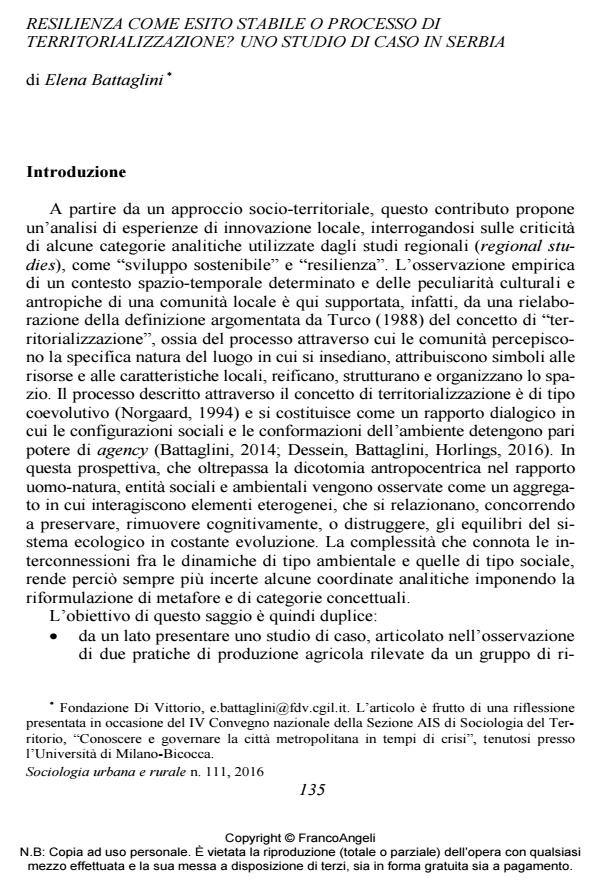Resilience as output or territorialisation process? A case-study from Serbia
Journal title SOCIOLOGIA URBANA E RURALE
Author/s Elena Battaglini
Publishing Year 2017 Issue 2016/111
Language Italian Pages 17 P. 135-151 File size 540 KB
DOI 10.3280/SUR2016-111009
DOI is like a bar code for intellectual property: to have more infomation
click here
Below, you can see the article first page
If you want to buy this article in PDF format, you can do it, following the instructions to buy download credits

FrancoAngeli is member of Publishers International Linking Association, Inc (PILA), a not-for-profit association which run the CrossRef service enabling links to and from online scholarly content.
This article introduces the case results of a study conducted in Sirogojno, situated in a Serb region with high potentialities of agricultural and tourist development. Research has represented the occasion for problematising some of the mainstream concepts in the debate within regional studies, as "sustainable development" and resiliency. Particularly, analysis proposes to illustrate this last concept as a dimension of "territorialisation", operationalised in the study.
Keywords: Endogenous development, sustainability, resilience, territorialisation, regional studies, case study.
- Adger N. (2006). Vulnerability. Global Environmental Change, 16: 268-281,
- Aydalot Ph., (ed.) (1986). Milieux Innovateurs en Europe. Paris: GREMI.
- Aydalot Ph., Keeble D., (eds) (1988). High Technology Industry and Innovative Environment. London: Routledge.
- Baker S. (2006). Sustainable Development. London and New York: Routledge.
- Battaglini E. (2005). Enhancing Local Sustainability: the role of Social Capital in the value attribution of a territory. In M. Järvelä, P. Jokinen, A. Puupponen (toim.), Kestävän kehityksen paikalliset verkostot. Local Sustainability Networks. Jyväskylä: Jyväskyla University Press.
- Battaglini E. (2014). Sviluppo territoriale. Dal disegno di ricerca alla valutazione dei risultati. Milano: FrancoAngeli.
- Battaglini E., Babović M., Bogdanov N. (2015). Framing Resilience in relation to Territorialisation. In A. Palovita e M. Järvelä, (eds). Climate adaptation, policy and food supply chain management in Europe. London: Routledge.
- Battaglini E., Babović M. (2016). Nature and culture in the territorialisation processes. Challenges and Insights from a case study in Serbia. In J. Dessein, E. Battaglini and L. Horlings L., (eds). Cultural Sustainability and Regional Development. Theories and Practices of territorialisation. London: Routledge.
- Brown D., Kulig J. (1996). The Concept of Resiliency. Theoretical Lessons from Community Research. Health and Canadian Society, 4: 29-52.
- Common M. (1995). Sustainability and Policy: Limits to Economics. Cambridge: Cambridge University Press.
- Dessein J., Battaglini E., Horlings L. (eds) (2016). Cultural Sustainability and Regional Development. Theories and practices of territorialisation. London: Routledge.
- Duit A., Galaz V., Eckerberg K., Ebbesson J. (2010). Governance, complexity, and resilience. Global Environmental Change, 20(3): 363-368, doi. 10.1016/j.gloenvcha.2010.04.006.
- Folke C. (2006). Resilience: the Emergence of a Perspective for Social-Ecological Systems Analyses. Global Environmental Change. 16(3): 253-267.
- Gibson J. (1979). The ecological approach to visual perception. Boston: Houghton Mifflin.
- Heijman W., Hagelaar G., van der Heide M. (2007). Rural resilience as a new development concept. EAAE seminar Serbian Association of Agricultural Economists. Novi Sad, Serbia.
- Keessen A.M., Hamer J.M., Van Rijswick H.F.M.W., Wiering M. (2013). The concept of resilience from a normative perspective: examples from Dutch adaptation strategies. Ecology and Society.18 (2): 45.http://dx.doi.org/10.5751/ES-05526-180245
- Lundvall B.Å., Johnson B. (1994). The Learning Economy. Journal of Industry Studies, Vol. 1 (2): 23-42.
- Marshall A. (1890). Principles of Economics. London: Macmillan.
- Marshall J.D., Toffel M.W. (2005). Framing the elusive concept of sustainability: a sustainability hierarchy. Environmental Science & Technology, 39(3): 673-682.
- Meloni B., Farinella D. (a cura di) (2013). Sviluppo rurale alla prova. Dal territorio alle politiche. Torino: Rosemberg & Sellier.
- Mubi Brighenti A. (2010). On Territoriology. Towards a General Science of Territory. Theory, Culture & Society, Vol. 27(1): 52–72.
- Norgaard R.B. (1994). Development Betrayed. The End of Progress and a Coevolutionary Revisioning of the Future. London and New York: Routledge.
- Pearce D.W., Barbier E., Markandya A. (1990). Sustainable Development: Economics and Environment in the Third World. London: Edward Elgar.
- Pelling M. (2003). The Vulnerability of Cities: Natural Disasters and Social Resilience. London: Earthscan.
- Peterson G.D., Allen C.R., Holling C.S. (1998). Ecological Resilience, Biodiversity and Scale. Ecosystems, 1.
- Polanyi M. (1966). The Tacit Dimension. Garden City, NY: Doubleday.
- Sciolla L. (2012). Sociologia dei processi culturali. Bologna: il Mulino.
- Solow R.M. (1956). A Contribution to the Theory of Economic Growth. The Quarterly Journal of Economics, Vol. 70 (1): 65-94.
- Stimson R.J., Stough R.R., Njikamp P.J. (eds) (2011). Endogenous Regional Development: Perspectives, Measurement and Empirical Investigation. Cheltenham, Gloucestershire: Edward Elgar.
- Storper M. (1995). The Resurgence of Regional Economics, Ten Years Later: The Region as a Nexus of Untraded Interdipendencies. European Urban and Regional Studies, Vol. 2 3.
- Storper M. (1997). The Regional World: Territorial Development in a Global Economy. New York: The Guildford Press.
- Timmerman P. (1981). Vulnerability, Resilience and the Collapse of Society: A Review of Models and Possible Climatic Applications. University of Toronto Canada: Institute for Environmental Studies.
- Turco A. (1988). Verso una teoria geografica della complessità. Milano: Unicopli.
- Turner R.K., Pearce D.W., Bateman I. (1994). Environmental Economics. An Elementary Introduction. New York: Harvester Wheatsheaf.
- Walker B., Holling C.S., Carpenter S.R., Kinzig A. (2004). Resilience, adaptability and transformability in social-ecological systems. Ecology and society 9(2): 5, <http://www.ecologyandsociety.org/ vol9/iss2/art5/>.
- Walker B., Salt D. (2006). Resilience thinking: sustaining ecosystems and people in a changing world. Washington: Island Press.
- Walker J., Cooper M. (2011). Genealogies of resilience: from systems ecology to the political economy of crisis adaptation. Security dialogue, 42(2): 143-160,
- WCED (1987). Our common future. Oxford: Oxford University Press.
- Yin R.K. (1984). Case Study Research. Design and Methods. Beverly Hills CA: Sage.
Elena Battaglini, Resilienza come esito stabile o processo di territorializzazione? Uno studio di caso in Serbia in "SOCIOLOGIA URBANA E RURALE" 111/2016, pp 135-151, DOI: 10.3280/SUR2016-111009